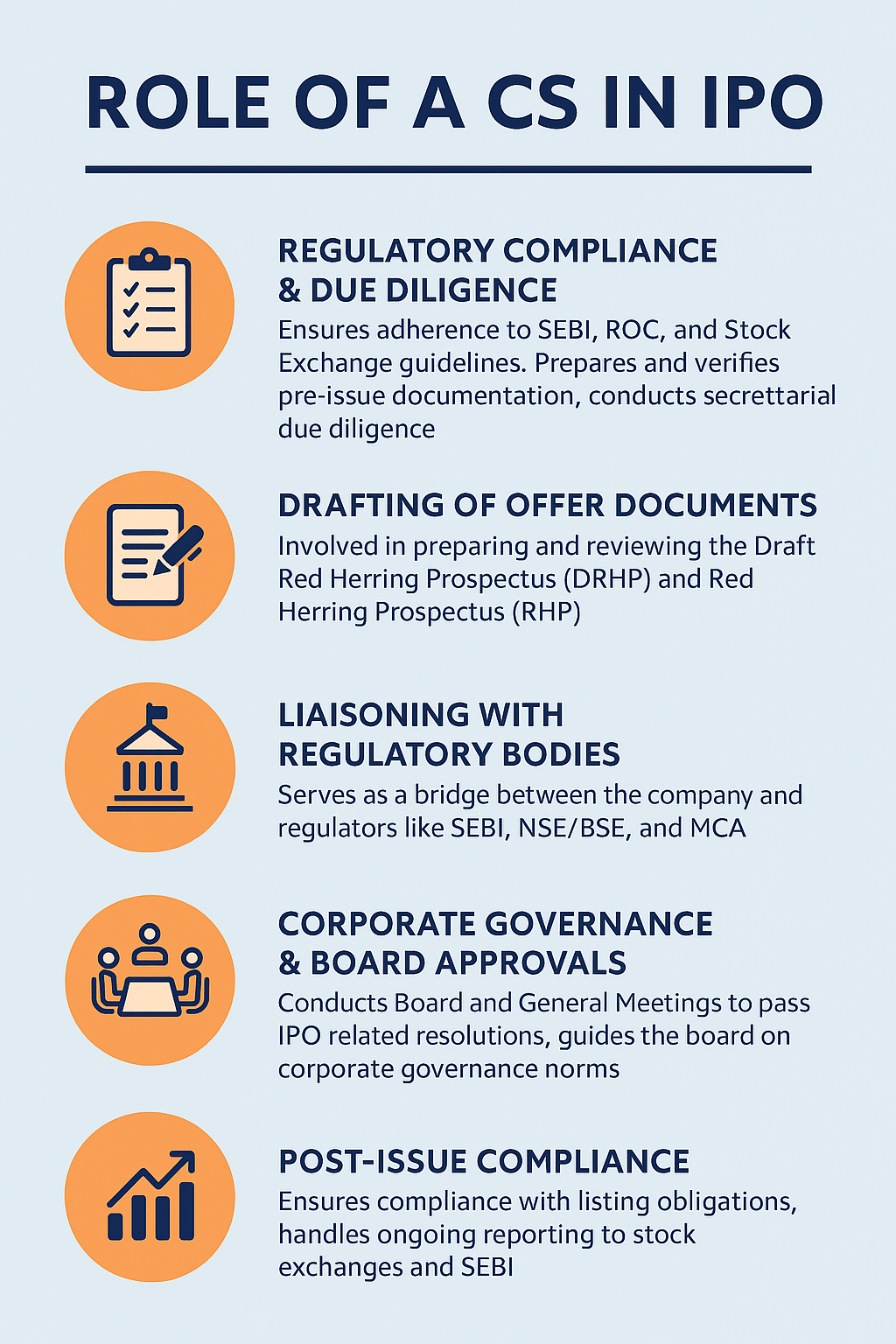Role of CS in IPO Process and Listing Compliance

A Company Secretary (CS) is usually regarded as the backbone of every organisation. They are the leading role in the smooth running of a company on a day-to-day basis, from ensuring legal compliance to governance. A CS, as defined by the Companies Act, 2013, is a Key Managerial Person (KMP), who’s entrusted with keeping things honest, abiding by the norms and regulations, and making sure that corporate workings are done well. From getting resolutions prepared and keeping records statutory to providing legal advice when required, the CS ensures the company operates honestly and well.
Initial Public Offering (IPO) and the CS
When a firm decides to go public with an Initial Public Offering (IPO), the workload of the CS essentially doubles. An IPO is a major milestone — it’s when a private firm offers its shares to the public for the first time and gets listed on a recognized stock exchange such as NSE or BSE. The entire process is strictly regulated by organizations such as SEBI and entails a lot of legal formalities, documentation, and coordination.
The CS plays a significant part during the Pre-IPO as well as the post-IPO stages.

Pre-IPO Roles & Responsibilities
- Establishment of an IPO Committee
The CS helps create an IPO committee (if necessary) to take key decisions and expedite the process.
- Regulatory Compliance Check
One of the main responsibilities of a CS is to ensure the company complies with all the eligibility criteria under SEBI rules, the Companies Act, and other concerned legislations prior to proceeding with the listing.
- Planning the Timeline
Timelines are absolutely critical in the IPO process. The CS creates and keeps track of deadlines so that everything goes smoothly and according to schedule.
- Appointing Advisors & Experts
The CS facilitates the recruitment of professionals like Auditors, Book Running Lead Managers (BRLMs), Legal Advisors, Independent Directors, etc., who will be required to manage the IPO effectively.
- Coordination Inside and Out
Handling all the IPO’s moving parts is a daunting task. The CS coordinates communication among the internal and external parties — from the BRLM, auditors, accountants, RoC, and even shareholders.
- Board Meetings & Minutes
At each step, the CS maintains minute details of board meetings to ensure there is a correct record of decisions and discussions.
- Corporate Governance
According to SEBI regulations, the CS has to ensure that the company adheres to all the governance norms such as company structure, the board of directors, board committees, disclosure of related party transactions, etc., etc.
- Updation of MoA and AoA
At times, the Memorandum and Articles of Association must be modified according to IPO standards. The CS takes care of the entire process — from scrutiny to facilitating board and shareholder meetings.
- Establishing Compliance Policies
The CS also engages in preparing internal policies such as the vigil mechanism, insider trading policy, and disclosures required.
- Financial Compliance
Ensuring that the company has complied with accounting standards in the correct manner and maintained a clean record (no adverse comments) in the last five years is another critical responsibility.
- Managing Payments and Dues
The CS ensures all the statutory dues — to banks, financial institutions, PF authorities, etc. — are made on time so there are no defaults prior to the IPO.
- Website Updates
SEBI mandates the company website is operational (and compliant) at least a month prior to going public. The CS ensures that’s done.
- Risk Management
Risk can’t be avoided — the CS does his best to ensure proper risk assessment systems are in place and that any significant risks are notified to the board in advance.
- Reviewing Agreements
Deals such as with the Registrar and Transfer Agent (RTA), Escrow Bank, Monitoring Agency, etc., are scrutinized and sometimes prepared by the CS to make them legally sound.
- Preparing and Filing Offer Documents
The CS is actively involved in the preparation of documents such as the DRHP (Draft Red Hoffer Prospectus), including the business model of the company, finances, risks, etc. They coordinate with legal and finance teams to ensure that all SEBI guidelines are complied with. The CS is responsible for completing the document, and later on, filing with SEBI, exchanges, and RoC.
Post-IPO Responsibilities
Once the IPO is complete and the company is listed, the CS becomes even more significant.

- Timely Disclosures & Filings
The CS ensures all filing requirements — financials, disclosures, and updates — are filed with SEBI and stock exchanges on time and error-free.
- Processing Investor Grievances
There is a specific email ID for grievances from investors, and the CS ensures all questions are monitored and resolved promptly.
- Managing Committees
Following the IPO, a number of committees such as Risk Management Committee, CSR Committee, and Stakeholders’ Relationship Committee must work effectively. The CS has to make sure these are dealt with according to norms of governance.
Conclusion
A Company Secretary is at the forefront in leading up to and following a company becoming listed. Their work in maintaining compliance, upholding transparency, and facilitating investor relationships is paramount to the company’s sustainable success on the public market. From strategy and documentation to governance and grievance management, the CS’s role cannot be exaggerated — they are genuinely one of the most vital pillars of the IPO process and beyond.
CSEET Syllabus 2025, New Updated Syllabus
CS ICSI Three Day Orientation Plan | May & June 2025 Batch Schedule
















